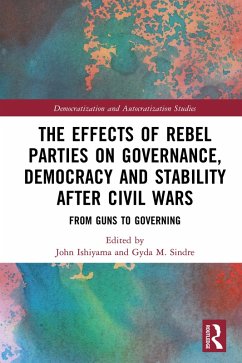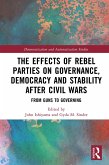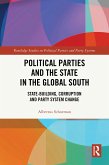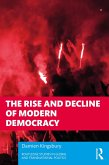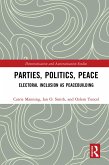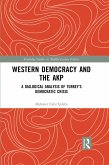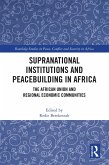The Effects of Rebel Parties on Governance, Democracy and Stability after Civil Wars (eBook, PDF)
From Guns to Governing
Redaktion: Ishiyama, John; Sindre, Gyda M.
42,95 €
42,95 €
inkl. MwSt.
Sofort per Download lieferbar

21 °P sammeln
42,95 €
Als Download kaufen

42,95 €
inkl. MwSt.
Sofort per Download lieferbar

21 °P sammeln
Jetzt verschenken
Alle Infos zum eBook verschenken
42,95 €
inkl. MwSt.
Sofort per Download lieferbar
Alle Infos zum eBook verschenken

21 °P sammeln
The Effects of Rebel Parties on Governance, Democracy and Stability after Civil Wars (eBook, PDF)
From Guns to Governing
Redaktion: Ishiyama, John; Sindre, Gyda M.
- Format: PDF
- Merkliste
- Auf die Merkliste
- Bewerten Bewerten
- Teilen
- Produkt teilen
- Produkterinnerung
- Produkterinnerung

Bitte loggen Sie sich zunächst in Ihr Kundenkonto ein oder registrieren Sie sich bei
bücher.de, um das eBook-Abo tolino select nutzen zu können.
Hier können Sie sich einloggen
Hier können Sie sich einloggen
Sie sind bereits eingeloggt. Klicken Sie auf 2. tolino select Abo, um fortzufahren.

Bitte loggen Sie sich zunächst in Ihr Kundenkonto ein oder registrieren Sie sich bei bücher.de, um das eBook-Abo tolino select nutzen zu können.
This book provides a systematic overview and in-depth analysis of the effects of rebel group inclusion on democracy following the end of conflict across the globe.
- Geräte: PC
- mit Kopierschutz
- eBook Hilfe
Andere Kunden interessierten sich auch für
![The Effects of Rebel Parties on Governance, Democracy and Stability after Civil Wars (eBook, ePUB) The Effects of Rebel Parties on Governance, Democracy and Stability after Civil Wars (eBook, ePUB)]() The Effects of Rebel Parties on Governance, Democracy and Stability after Civil Wars (eBook, ePUB)42,95 €
The Effects of Rebel Parties on Governance, Democracy and Stability after Civil Wars (eBook, ePUB)42,95 €![Political Parties and the State in the Global South (eBook, PDF) Political Parties and the State in the Global South (eBook, PDF)]() Albertus SchoemanPolitical Parties and the State in the Global South (eBook, PDF)42,95 €
Albertus SchoemanPolitical Parties and the State in the Global South (eBook, PDF)42,95 €![The Rise and Decline of Modern Democracy (eBook, PDF) The Rise and Decline of Modern Democracy (eBook, PDF)]() Damien KingsburyThe Rise and Decline of Modern Democracy (eBook, PDF)41,95 €
Damien KingsburyThe Rise and Decline of Modern Democracy (eBook, PDF)41,95 €![Parties, Politics, Peace (eBook, PDF) Parties, Politics, Peace (eBook, PDF)]() Carrie ManningParties, Politics, Peace (eBook, PDF)42,95 €
Carrie ManningParties, Politics, Peace (eBook, PDF)42,95 €![Rebel Financing and Terrorism in Civil Wars (eBook, PDF) Rebel Financing and Terrorism in Civil Wars (eBook, PDF)]() Margherita BelgioiosoRebel Financing and Terrorism in Civil Wars (eBook, PDF)21,95 €
Margherita BelgioiosoRebel Financing and Terrorism in Civil Wars (eBook, PDF)21,95 €![Western Democracy and the AKP (eBook, PDF) Western Democracy and the AKP (eBook, PDF)]() Mehmet Celil ÇelebiWestern Democracy and the AKP (eBook, PDF)37,95 €
Mehmet Celil ÇelebiWestern Democracy and the AKP (eBook, PDF)37,95 €![Supranational Institutions and Peacebuilding in Africa (eBook, PDF) Supranational Institutions and Peacebuilding in Africa (eBook, PDF)]() Supranational Institutions and Peacebuilding in Africa (eBook, PDF)42,95 €
Supranational Institutions and Peacebuilding in Africa (eBook, PDF)42,95 €-
-
-
This book provides a systematic overview and in-depth analysis of the effects of rebel group inclusion on democracy following the end of conflict across the globe.
Dieser Download kann aus rechtlichen Gründen nur mit Rechnungsadresse in A, B, BG, CY, CZ, D, DK, EW, E, FIN, F, GR, HR, H, IRL, I, LT, L, LR, M, NL, PL, P, R, S, SLO, SK ausgeliefert werden.
Produktdetails
- Produktdetails
- Verlag: Taylor & Francis eBooks
- Seitenzahl: 292
- Erscheinungstermin: 30. November 2022
- Englisch
- ISBN-13: 9781000772524
- Artikelnr.: 66110205
- Verlag: Taylor & Francis eBooks
- Seitenzahl: 292
- Erscheinungstermin: 30. November 2022
- Englisch
- ISBN-13: 9781000772524
- Artikelnr.: 66110205
- Herstellerkennzeichnung Die Herstellerinformationen sind derzeit nicht verfügbar.
John Ishiyama is a University Distinguished Research Professor of Political Science at the University of North Texas, USA. Gyda M. Sindre is an Associate Professor in International Politics at the University of York, UK.
1. Introduction: Rebel group inclusion and post-war democratisation Part 1:
Rebel group inclusion and good governance 2. The Effects of Rebel Parties
on Governance: Organizational Endowments, Ideology, and Governance after
Civil Wars End 3. Dynamics of post-rebel party governance in Aceh and East
Timor: Balancing patronage politics and popular democracy 4. From 'Rebel
Justice' to the 'Rule-of-Law': The cases of Hamas and Hezbollah 5. The
Struggle for Political Stability and Governance in Northern Ireland after
the Peace Process: The role of Sinn Féin and the IRA 6. The KLA successor
parties and the spoils of peace in Kosovo Part 2: Rebel group inclusion and
democracy 7. How does the inclusion of post-rebel parties shape democracy?
Parties, elections and peace in Mozambique, 1992-2018 8. The Political
Integration of Islamist Armed Groups: A Viable Path to Peace and Democracy?
9. Adapting too well? Rebel reconversion and democratization in El Salvador
10. Post-War Ruling Parties and their Youth Wings: How Old Rebels handle
the African Millennials 11. Rebel Participation and Political Transition in
Post-War Sri Lanka Part 3: Rebel group inclusion and political stability
12. Political Parties in De Facto States: Links with External Patrons 13.
The Ethiopian People's Revolutionary Democratic Front: Coalition Dynamics
and Post-War Politics 14. Contingency, Inclusion, and Democracy: A Critical
Analysis of Jamyat-e- Islami in the Afghan State Building Process 15.
Virtual Politics, post-Islamism and authoritarian Inertia in post-conflict
Tajikistan 16. Conclusion: Towards a theory of rebel group inclusion and
democratisation
Rebel group inclusion and good governance 2. The Effects of Rebel Parties
on Governance: Organizational Endowments, Ideology, and Governance after
Civil Wars End 3. Dynamics of post-rebel party governance in Aceh and East
Timor: Balancing patronage politics and popular democracy 4. From 'Rebel
Justice' to the 'Rule-of-Law': The cases of Hamas and Hezbollah 5. The
Struggle for Political Stability and Governance in Northern Ireland after
the Peace Process: The role of Sinn Féin and the IRA 6. The KLA successor
parties and the spoils of peace in Kosovo Part 2: Rebel group inclusion and
democracy 7. How does the inclusion of post-rebel parties shape democracy?
Parties, elections and peace in Mozambique, 1992-2018 8. The Political
Integration of Islamist Armed Groups: A Viable Path to Peace and Democracy?
9. Adapting too well? Rebel reconversion and democratization in El Salvador
10. Post-War Ruling Parties and their Youth Wings: How Old Rebels handle
the African Millennials 11. Rebel Participation and Political Transition in
Post-War Sri Lanka Part 3: Rebel group inclusion and political stability
12. Political Parties in De Facto States: Links with External Patrons 13.
The Ethiopian People's Revolutionary Democratic Front: Coalition Dynamics
and Post-War Politics 14. Contingency, Inclusion, and Democracy: A Critical
Analysis of Jamyat-e- Islami in the Afghan State Building Process 15.
Virtual Politics, post-Islamism and authoritarian Inertia in post-conflict
Tajikistan 16. Conclusion: Towards a theory of rebel group inclusion and
democratisation
1. Introduction: Rebel group inclusion and post-war democratisation Part 1:
Rebel group inclusion and good governance 2. The Effects of Rebel Parties
on Governance: Organizational Endowments, Ideology, and Governance after
Civil Wars End 3. Dynamics of post-rebel party governance in Aceh and East
Timor: Balancing patronage politics and popular democracy 4. From 'Rebel
Justice' to the 'Rule-of-Law': The cases of Hamas and Hezbollah 5. The
Struggle for Political Stability and Governance in Northern Ireland after
the Peace Process: The role of Sinn Féin and the IRA 6. The KLA successor
parties and the spoils of peace in Kosovo Part 2: Rebel group inclusion and
democracy 7. How does the inclusion of post-rebel parties shape democracy?
Parties, elections and peace in Mozambique, 1992-2018 8. The Political
Integration of Islamist Armed Groups: A Viable Path to Peace and Democracy?
9. Adapting too well? Rebel reconversion and democratization in El Salvador
10. Post-War Ruling Parties and their Youth Wings: How Old Rebels handle
the African Millennials 11. Rebel Participation and Political Transition in
Post-War Sri Lanka Part 3: Rebel group inclusion and political stability
12. Political Parties in De Facto States: Links with External Patrons 13.
The Ethiopian People's Revolutionary Democratic Front: Coalition Dynamics
and Post-War Politics 14. Contingency, Inclusion, and Democracy: A Critical
Analysis of Jamyat-e- Islami in the Afghan State Building Process 15.
Virtual Politics, post-Islamism and authoritarian Inertia in post-conflict
Tajikistan 16. Conclusion: Towards a theory of rebel group inclusion and
democratisation
Rebel group inclusion and good governance 2. The Effects of Rebel Parties
on Governance: Organizational Endowments, Ideology, and Governance after
Civil Wars End 3. Dynamics of post-rebel party governance in Aceh and East
Timor: Balancing patronage politics and popular democracy 4. From 'Rebel
Justice' to the 'Rule-of-Law': The cases of Hamas and Hezbollah 5. The
Struggle for Political Stability and Governance in Northern Ireland after
the Peace Process: The role of Sinn Féin and the IRA 6. The KLA successor
parties and the spoils of peace in Kosovo Part 2: Rebel group inclusion and
democracy 7. How does the inclusion of post-rebel parties shape democracy?
Parties, elections and peace in Mozambique, 1992-2018 8. The Political
Integration of Islamist Armed Groups: A Viable Path to Peace and Democracy?
9. Adapting too well? Rebel reconversion and democratization in El Salvador
10. Post-War Ruling Parties and their Youth Wings: How Old Rebels handle
the African Millennials 11. Rebel Participation and Political Transition in
Post-War Sri Lanka Part 3: Rebel group inclusion and political stability
12. Political Parties in De Facto States: Links with External Patrons 13.
The Ethiopian People's Revolutionary Democratic Front: Coalition Dynamics
and Post-War Politics 14. Contingency, Inclusion, and Democracy: A Critical
Analysis of Jamyat-e- Islami in the Afghan State Building Process 15.
Virtual Politics, post-Islamism and authoritarian Inertia in post-conflict
Tajikistan 16. Conclusion: Towards a theory of rebel group inclusion and
democratisation
